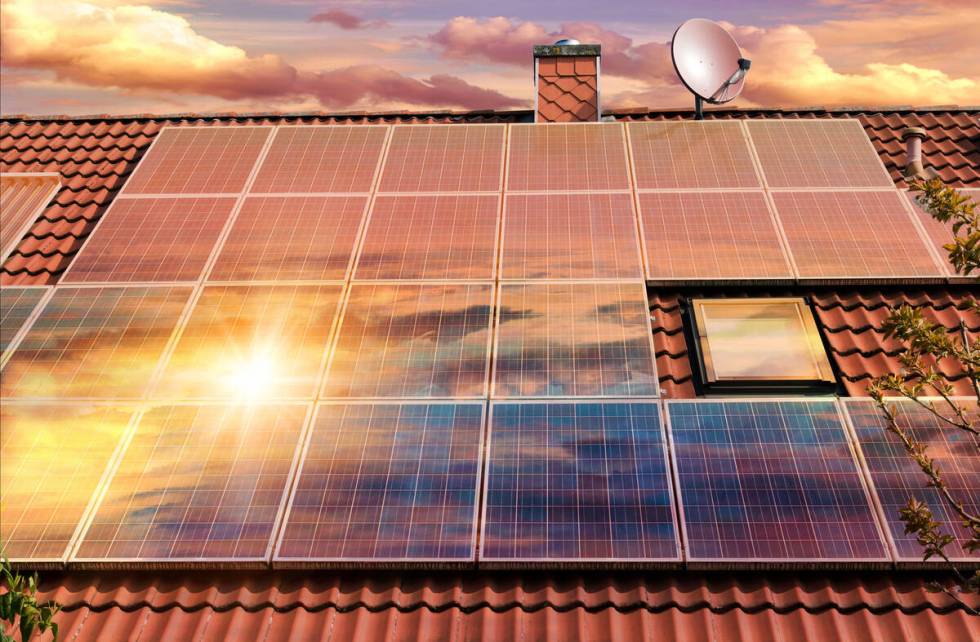Want to save money with solar panels? Here’s what you need to know

Southern Nevada sees sunshine almost every day, and residential rooftop solar panels can help people turn that sunshine into reduced monthly energy bills.
All Nevada residential property owners are entitled to install renewable energy infrastructure to their homes including solar panels and energy storage. The Public Utilities Commission has the “Renewable Energy Bill of Rights” on its website detailing ways Nevadans are allowed to access renewable energy.
But aside from the current protections in state law, it’s important for customers to know how to vet proposals and promises made by solar installation companies. according to Mark Krueger, a chief deputy and consumer counsel for the Nevada Attorney General’s Office, which oversees the Bureau of Consumer Protection, the office that handles consumer complaints against certain solar companies. This is can be vital as Krueger said the costs of solar panel installations can run between $20,000 and $80,000 depending on the type and size of solar panels installed.
Some recent fliers in Las Vegas promised solar installations could save residents up to 40 – 45 percent on their monthly electricity bill. Krueger said widespread savings promises can’t be guaranteed across a wide range of homes due to variability of energy generated from solar panels and terms in solar installation contracts.
“Generally you’re going to see some sort of savings, but it depends on the cost of your energy bill,” said Krueger. “Some factors are, how much sunlight you get, the actual cost of the solar panels, whether you’re purchasing, whether they’re financing them, and other incentives provided for in the contract. … Some people won’t see breaks until several years down the road, others will see them earlier.”
But the state’s net metering program allows residents to use energy generated by their solar system to offset their monthly power bill and earn credits for excess energy.
Complaints increasing
The complaints over the sales of solar panels have “progressively” increased every year since 2015. Krueger said many of the complaints centered on either misinformation on costs or savings with solar panel installation or hard-nosed sales tactics.
“We had seen a progressive increase year over year of solar complaints,” Krueger said. “In pretty much the same type of general fact pattern that (customers) were induced to purchase based on representations made during the sales process and oftentimes, those included facts and information that were simply wrong.”
Krueger shared three tips to follow when considering installing solar panels.
— Always ask the name of the installation company and check if the company has a valid license with the Nevada State Contractors Board’s website. Also check the company’s public reputation, which can be done by checking online reviews.
— Read any contract carefully and contact an attorney to review the terms or talk with trusted family or friends before signing anything.
— Educate yourself on types of solar panels and the electricity demands of your home before agreeing to installation since some solar panels can provide too little power for certain homes to provide real financial benefits.
“Understand how much savings you anticipate. Understand, if you’re financing it, what the financing terms are,” Krueger said. “Take your time to really go through the contract.”
New regulations to come
A new law passed this year by the Legislature, Senate Bill 293, will also beef up some protections for customers.
The law, which takes effect in 2024, will require solar installation companies or contractors to use their employees, instead of freelance sales people, to make sales. Krueger said this will make it easier for solar companies to face consequences for improper sales tactics.
Other parts of the law provide some exits for customers, including allowing a customer to cancel an agreement within three business days. Another allows a customer to cancel a contract if the contractor or solar installation company has committed any violations of state law.
The law also requires that a solar company must confirm a customer’s identity and have a recorded conversation that covers the basic provisions of a solar contract in order for solar panels to be installed. Additionally, solar contracts must be provided in languages other than English if the encounter between the solar company and the customer was in a language other than English.
Contact Sean Hemmersmeier at shemmersmeier@reviewjournal.com. Follow @seanhemmers34 on Twitter.